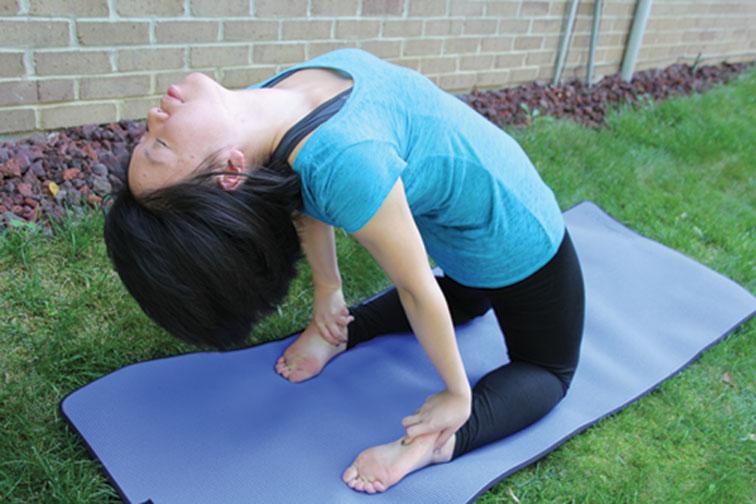Joline Zhong, Yoga student and senior had studied for her final examination for weeks but found herself panicking the night before the exam. As she continued to study, her notes and papers were scattered across her workspace, reflecting the panic rising within her.

One year later, after participating in a six-week yoga and meditation class, Zhong feels much more peaceful and relaxed than she had previously.
Mindfulness-Based Stress Reduction (MBSR) programs, which include yoga and meditation, are meant to help people relieve stress. According to Diana Singleton, Clinical Coordinator of Buchanan Counseling Center and MBSR Workshop instructor, mindfulness is the practice of focusing on the moment in the now and being present in the moment nonjudgmentally.
“Our mind typically is most comfortable going either into the past and thinking about regrets or replaying stories from our paths, or we’re in our future, thinking about what we have to do or worrying about what we need to accomplish or what we need to study or take care of, and we’re not very often just in the moment, in the now,” Singleton said. “And so, when I say the now, I mean just this now, just this moment, so you train your mind to just focus on being in the very moment that you’re in.”
Zhong, who practices yoga and meditation, has not practiced mindfulness, said meditation and yoga have helped her focus on the present instead of the past.
“I remember my yoga teacher always said, ‘Forget the past; forget what you did before you came to my class today; just focus on right now; focus on what is in front of you right this moment.’ I love this quote because it fits the definition of mindfulness,” Zhong said.
Originally, mindfulness was associated with spiritual practices and had been in faith communities until more recent times. According to Singleton, Jon Kabat-Zinn, founding Executive Director of the Center for Mindfulness in Medicine, Health Care and Society at the University of Massachusetts Medical School, brought mindfulness practices to the medical community.
Singleton said, “It can be for people who have medical conditions. I have all kinds of different folks that come to my class, so I have people, a lot of people who come who have stress-related jobs at Methodist Hospital. Some of them have medical conditions, but many of them have work-related stress.”
Singleton said the purpose of mindfulness is to decrease stress and fight-or-flight chemicals in the mind and body.
“(Brain-body chemistry includes) an increased pulse rate, an increased heart rate; all of that brain-body chemistry is appropriate if your stressor was something like you needed to get away from a saber-toothed tiger but now, in our current environment, we don’t have those kind of threats,” Singleton said. “The threats are more psychological, like we’re fearful that we won’t do well on a test, and that will result in impairing our future, so that chemistry actually isn’t useful anymore to us, so we have to counteract it. Mindfulness actually elicits rest-and-digest chemistry, so it’s the opposite of fight-flight-freeze chemistry; it’s rest-digest chemistry.”
According to Singleton, participants of the MBSR program she teaches practice formal meditation with the body scan meditation, gentle yoga, sitting meditation and walking meditation.
One of the meditation practices Zhong does is the sitting meditation. She first practices her yoga poses for about 20 minutes, and after the yoga, she meditates for about 10 minutes.
“When you do meditation, it helps clear your mind and helps you think in a better way,” Zhong said.
Singleton said MBSR programs are also helpful for students who are stressed.
Student Assistance Coordinator Jane Wildman said, “(CHS) is a very academic school, and a lot of the parents are educated, some highly educated, and it causes a particular climate here. Kids feel a lot of stress to do well, you know, competition to get in the best schools or competition to beat their peers. There’s all sorts of academic stress, so in addition, a lot of students have stresses outside the school, stresses with family (or) friends. A lot of outside influences can cause stress that prevents students or makes it very difficult for students to focus at school.”
Zhong said she can think straight without being stressed and can study better for tests as well after doing yoga and meditation, which are also practices of MBSR programs.
“I think (an MBSR program) would be a good program. I mean I would go into it if I signed up for it. I think that goes well with yoga. They both help relieve stress, and even if you’re not having a hard time, I think yoga and mindfulness, I think it’s great to learn, and it’s very essential to have,” Zhong said.
Now, the morning has come, and as Zen music fills the room while she lies on the yoga mat with her palms facing the ceiling, Zhong closes her eyes, relaxing and clearing her mind from stress.
































![What happened to theater etiquette? [opinion]](https://hilite.org/wp-content/uploads/2025/04/Entertainment-Perspective-Cover-1200x471.jpg)













































![Review: “The Immortal Soul Salvage Yard:” A criminally underrated poetry collection [MUSE]](https://hilite.org/wp-content/uploads/2025/03/71cju6TvqmL._AC_UF10001000_QL80_.jpg)
![Review: "Dog Man" is Unapologetically Chaotic [MUSE]](https://hilite.org/wp-content/uploads/2025/03/dogman-1200x700.jpg)
![Review: "Ne Zha 2": The WeChat family reunion I didn’t know I needed [MUSE]](https://hilite.org/wp-content/uploads/2025/03/unnamed-4.png)
![Review in Print: Maripaz Villar brings a delightfully unique style to the world of WEBTOON [MUSE]](https://hilite.org/wp-content/uploads/2023/12/maripazcover-1200x960.jpg)
![Review: “The Sword of Kaigen” is a masterpiece [MUSE]](https://hilite.org/wp-content/uploads/2023/11/Screenshot-2023-11-26-201051.png)
![Review: Gateron Oil Kings, great linear switches, okay price [MUSE]](https://hilite.org/wp-content/uploads/2023/11/Screenshot-2023-11-26-200553.png)
![Review: “A Haunting in Venice” is a significant improvement from other Agatha Christie adaptations [MUSE]](https://hilite.org/wp-content/uploads/2023/11/e7ee2938a6d422669771bce6d8088521.jpg)
![Review: A Thanksgiving story from elementary school, still just as interesting [MUSE]](https://hilite.org/wp-content/uploads/2023/11/Screenshot-2023-11-26-195514-987x1200.png)
![Review: "When I Fly Towards You", cute, uplifting youth drama [MUSE]](https://hilite.org/wp-content/uploads/2023/09/When-I-Fly-Towards-You-Chinese-drama.png)
![Postcards from Muse: Hawaii Travel Diary [MUSE]](https://hilite.org/wp-content/uploads/2023/09/My-project-1-1200x1200.jpg)
![Review: "Ladybug & Cat Noir: The Movie," departure from original show [MUSE]](https://hilite.org/wp-content/uploads/2023/09/Ladybug__Cat_Noir_-_The_Movie_poster.jpg)
![Review in Print: "Hidden Love" is the cute, uplifting drama everyone needs [MUSE]](https://hilite.org/wp-content/uploads/2023/09/hiddenlovecover-e1693597208225-1030x1200.png)
![Review in Print: "Heartstopper" is the heartwarming queer romance we all need [MUSE]](https://hilite.org/wp-content/uploads/2023/08/museheartstoppercover-1200x654.png)



